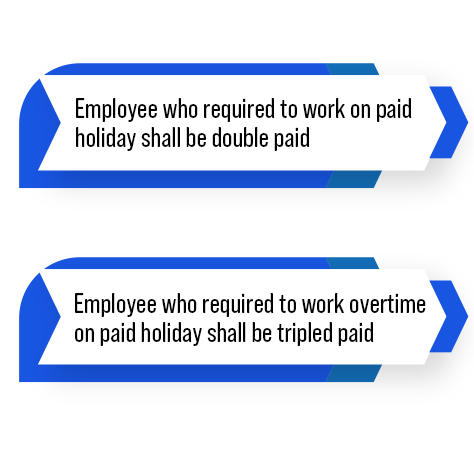Benefits to an Employee
Retain Your Best Employees
Employee salary or wages may vary depending on their academic qualification, skills, working experience or maybe technical knowledge on the job offer by the organisation or business establishment. Salary also can be offered according to working time per day or based on sales commission.
The Employment Act provides minimum terms and conditions (mostly of monetary value) to a certain category of workers Under the Employment Act 1955 (Amendments 2012), every employer shall pay to each of his employees not later than the 7th day of the month.Payment on normal termination of contract shall be paid to such employee on the same day on which such contract of service terminates.
Monetary advances to employees shall not exceed the aggregate the amount of wages which the employee earned in the preceding month unless such advance is made to the employee to enable him to purchase:
-
- A house or to build or improve a house;
- Land;
- Livestock;
- A motorcar, a motorcycle or a bicycle; and
- Shares of the employer’s business offered for sale by the employer.
Wages are not payable during the period when an employee is imprisoned or attending to a court otherwise than as a witness on his employer’s behalf. No deduction of wages can be made by an employer other than:
-
- Deductions to the extent of any overpayment of wages made within 3 months of the mistake.
- Deductions for the indemnity due to the employer by the employee.
- Deductions for the recovery of advances of wages.
- Deductions authorized by written law, such as EPF, SOCSO, PCB, etc.
- Deductions upon employee’s written request, in respect of the payments to a registered trade union or co-operative thrift and loan society of any sum of money due to the trade union or society by the employee on account of entrance fees, subscriptions, installments and interest on loans, or other dues.
- Deductions upon employee’s written request, in respect of payments for any ESOS shares.
- Deductions upon employee’s written request, in respect of payments to a third party on behalf of the employee.
- Deductions upon employee’s written request, in respect of payments for the purchase by the employee of any goods of the employer’s business, offered for sale by the employer.
- Deductions in respect of the rental for accommodation and the cost of services, food, and meals provided by the employer to the employee at the employee’s request or under the terms of the employee’s contract of service.
The total deduction shall not exceed 50% of the employee’s monthly wages,unless for:
-
- Indemnity payable by an employer to an employee
- Final payment of the wages of an employee for any amount due to the employer and remaining unpaid by the employee on the termination of the employee’s contract of service
- Repayment of a housing loan (where an additional limit of 25% applied)
However, it is legal for an employer to provide the employee with house accommodation, food, fuel, light, water, medical attendance, or any approved amenity, or approved service in addition to wages but no employer shall provide an employee with any intoxicating liquor as part of the terms of a contract of service.
Other employee benefits called fringe benefits include various types of non-wage compensation provided to employees in addition to their normal wages or salaries.

Employment Of Women
No employer shall require any female employee to work in any industrial or agricultural undertaking between 10 pm to 5 am nor commence work for the day without having had a period of eleven consecutive hours free from such work.
However, the Director-General * may, on application made to him in any particular case, except in writing any female employee or class of female employees from any restriction in this subsection, subject to any conditions he may impose.

Maternity Protection
Every female employee shall be entitled to maternity leave for a period of not less than 60 consecutive days in respect of each confinement. Maternity leave shall not commence earlier than a period of 30 days immediately preceding the confinement of a female employee or later than the day immediately following her confinement.
A female employee shall be entitled to receive maternity allowance if she:
-
- Has been employed more than 4 months before confinement.
- Is employed more than 90 days during the 9 months immediately before her confinement.
If a female employee dies from any cause during the maternity leave period, her maternity allowance shall be paid to her nominee.
The employer cannot terminate a female employee who remains absent from her work after the expiration of the maternity leave as a result of illness related to pregnancy or confinement and certified by a registered medical practitioner until her absence exceeds a period of 90 days after the maternity leave.

Working Hours
An employee shall not be required under his contract of service to work:
-
- More than 5 consecutive hours without a period of leisure of not less than 30 minutes duration;
- More than 8 hours in one day;
- In excess of a spread over period of 10 in one day;
- More than 48 hours in one week
However, an employee may be required by his employer to exceed the limit of hours above and to work on a rest day, in the case of:
-
- Accident, actual or threatened, in his place of work;
- Work, the performance of which is essential to the life of the community;
- Work essentially for the defense or security of Malaysia;
- Urgent work to be done to machinery or plant;
- An interruption of work which it was impossible to foresee; or
- Work to be performed by employees in any industrial undertaking essential to the economy of Malaysia or any essential service as defined under the Industrial Relations Act.


Sick Leave
An employee shall, after examination by registered medical practitioner at the expense of the employer, be entitled to paid sick leave:
If there is no hospitalisation, the number of days of sick leave shall be:
-
- 14 days in each calendar year if the employee has been employed for less than 2 years;
- 18 days in each calendar year if the employee has been employed for 2 years or more but less than 5 years;
- 22 days in each calendar year if the employee has been employed for 5 years or more; or
If there is hospitalisation:
-
- 60 days in each calendar year if hospitalisation is necessary, as may be certified by such registered medical practitioner or medical officer.
An employee who absents himself on sick leave:
-
- Which is not certified by a registered medical practitioner or a medical officer or a dental surgeon; or
- Which is certified by such registered medical practitioner or medical officer or dental surgeon, but without informing or attempting to inform his employer of such sick leave within 48 hours of the commencement thereof; shall be deemed to absent himself from work without the permission of his employer and without reasonable excuse for the days on which he is so absent from work.
The employer shall pay the employee his ordinary rate of pay for every day of such sick leave and an employee on a monthly rate of pay shall be deemed to have received his sick leave pay if he receives from his employer his monthly wages for the day or days on which he is on sick leave.

Annual Leave
An employee shall be entitled to a paid annual leave of:
- 8 days for every 12 months of continuous service with the same employer if he has been employed by that employer for a period of less than 2 years;
- 12 days for every 12 months of continuous service with the same employer if he has been employed by that employer for a period of 2 years or more but less than 5 years; and
- 16 days for every 12 months of continuous service with the same employer if he has been employed by that employer for a period of 5 years or more; and if he has not completed 12 months of continuous service with the same employer during the year in which his contract of service terminates, his entitlement to paid annual leave shall be in direct proportion to the number of completed months of service.
Any fraction of a day of annual leave so calculated which is less than one-half of a day shall be disregarded, and where the fraction of a day is one-half or more it shall be deemed to be one day.
An employee who is on paid annual leave becomes entitled to sick leave or maternity leave while on such annual leave, the employee shall be granted the sick leave or the maternity leave and the annual leave shall be deemed to have not been taken.
If at the request of his employer, the employee agrees in writing, not to taken annual leave, he is then entitled to payment in lieu of annual leave.

Public Holidays
Every employee shall be entitled to a paid holiday at his ordinary rate of pay on the following days in any one calendar year:
-
- on 10 of the gazetted public holidays, 4 of which shall be;
- National Day
- Birthday of the Yang di-Pertuan Agong;
- Birthday of the Ruler or the Yang di-Pertua Negeri of the State or the Federal Territory Day; and
- Labour Day; and
- on any day declared as a public holiday under section 8 of the Holidays Act 1951*;
- If a public holiday falls on a rest day the working day following immediately the rest day shall be a paid holiday in substitution.
- on 10 of the gazetted public holidays, 4 of which shall be;
Any employee who absents himself from work on a working day immediately preceding or immediately succeeding a public holiday shall not be entitled to any holiday pay for such holiday.
* Only applicable to Peninsular Malaysia & Federal Territory
Complaints
The Director-General may inquire into and decide any dispute between an employee and his employer in respect of wages or any other payments in cash due to such employee under any term of the contract of service or provision under the Employment Act.
However, the Director-General shall not inquire into, hear, decide or make any order in respect of any claim, dispute that is:
- pending in any inquiry or proceedings under that the Industrial Relations Act;
- has been decided upon by the Minister under section 20(3) of that Act; or
- Has been referred to, or is pending in any proceedings before, the Industrial Court.
The power of the Director-General under section 69(1)(a) also extends to employees whose wages per month exceed RM2000 but does not exceed RM5000.
Retirement Fund, Social Security And Insurance
Under Malaysian labor law, there are few important benefits you must provide once you start getting people to work for you and earned their salary, these benefit can be automatically deducted from employee salary and also the contribution by the employer:
- Employees Provident Fund (EPF)
- Social Security Organisation (SOCSO)
- Medical insurance
These benefits must be clearly understood and written in the appointment letter to your employee. Beside this, other benefits are not compulsory for you to offer unless you decide to give it as a gratitude for your employee working excellence or for reaching a certain sales target.
The above is correct on 14th October 2021.

